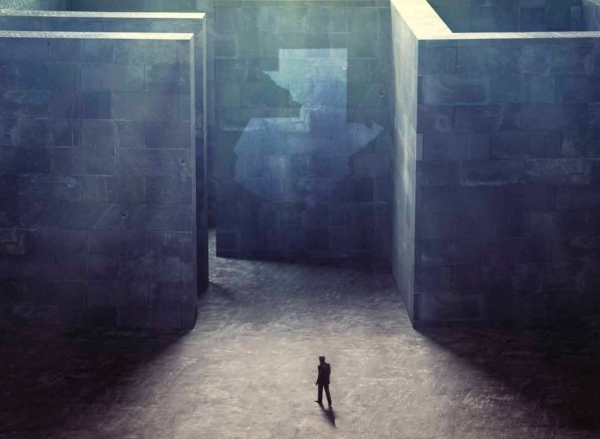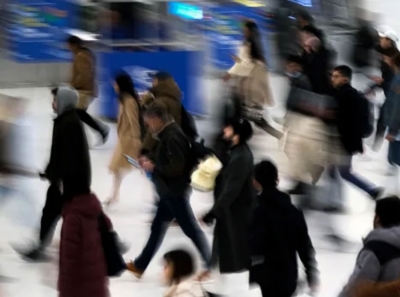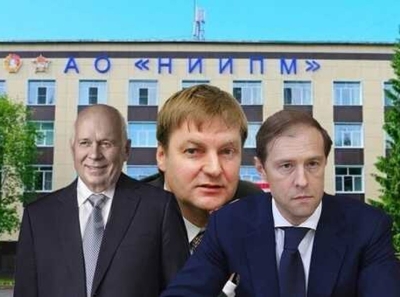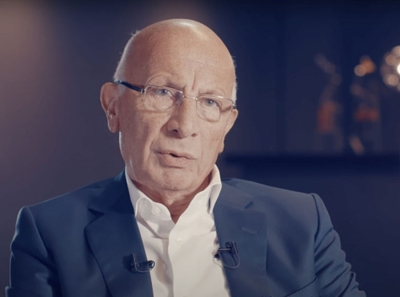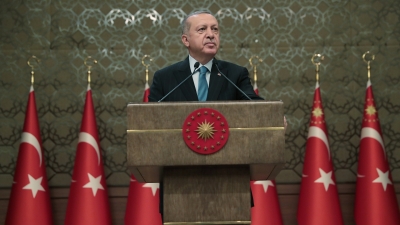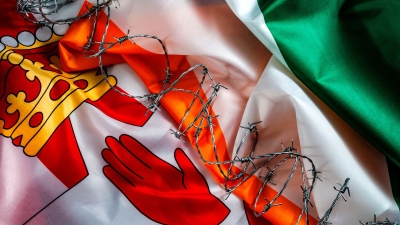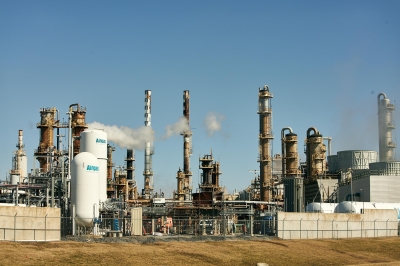Reveal revisits a story produced in collaboration with a Guatemalan journalist who is now in prison. José Rubén Zamora was jailed last summer after his newspaper, elPeriódico, published more than 100 stories about corruption within Guatemala’s government.
Corruption is a longstanding problem in Guatemala, and it’s intertwined with U.S. policy in Central America. At times, the U.S. has had a corrupting influence on Guatemalan politics; at others, it has supported transparency. This week’s show looks at the root causes of corruption and impunity in Guatemala and how they have prompted generations of Guatemalans to flee their country and migrate north.
Veteran radio journalist Maria Martin takes us to Huehuetenango, a province near Guatemala’s border with Mexico. For decades, residents have been migrating to the U.S. to help support families struggling with poverty. We then connect the migration outflow to U.S. policy during the Cold War and its support of brutal dictatorships in Guatemala that were plagued by corruption.
Then Reveal’s Anayansi Diaz-Cortes introduces us to a crusading prosecutor named Iván Velásquez. In the early 2000s, Velásquez was tasked with running an international anti-corruption commission in Guatemala, known by its Spanish acronym, CICIG. Its mandate was to root out corruption and improve the lives of Guatemalans so they wouldn’t feel compelled to leave their homes. Velásquez had a reputation for jailing presidents and paramilitaries, but met his match when he went after Jimmy Morales, a television comedian who was elected president in 2015. Morales found an ally in then-U.S. President Donald Trump, whose administration helped Morales dismantle CICIG.
With CICIG gone, journalists were left to expose government corruption – journalists like Zamora, who was arrested last summer on trumped-up charges. Diaz-Cortes speaks with Zamora’s son about his father’s arrest and the state of journalism in Guatemala.
This is an update of an episode that originally aired in September 2020.
Dig Deeper
Read: How Donald Trump Took Down the Robert Mueller of Latin America
Credits
Reporters: Maria Martin, Anayansi Diaz-Cortes and Aaron Glantz | Producer: Anayansi Diaz-Cortes | Editors: Kevin Sullivan, Taki Telonidis and Aaron Glantz | Production managers: Steven Rascón and Zulema Cobb | Digital producers: Kate Howard and Nikki Frick | Mixing, sound design and music: Jim Briggs and Fernando Arruda | Production assistance: Claire Mullen | Interim executive producers: Brett Myers and Taki Telonidis | Host: Al Letson
Special thanks: The Fund for Investigative Journalism, Willi Vergara, Laura C. Morel, Monica Campbell, Henry Bin, Félix Perez Mendoza, Ximena Villagrán, José Carlos Zamora, Jo Marie Burt, Deborah George, Martin Reynolds, Kate Doyle, Luis Solano, Paula Worby, Daniella Borgi-Palomino and Adam Isacson
Support for Reveal is provided by the Reva and David Logan Foundation, the John D. and Catherine T. MacArthur Foundation, the Jonathan Logan Family Foundation, the Ford Foundation, the Heising-Simons Foundation, Democracy Fund, and the Inasmuch Foundation.
Transcript
Reveal transcripts are produced by a third-party transcription service and may contain errors. Please be aware that the official record for Reveal’s radio stories is the audio.
| Al Letson: | From the Center for Investigative Reporting and PRX, this is Reveal. I’m Al Letson. Today, we’re bringing you an important update to a story about the legacy of US policy in Latin America and how the politics of the Cold War connect to the immigration issue. The story takes us to Guatemala and we first aired it in the fall of 2020. We also created a written version in Spanish that was published in El Periódico, one of Guatemala’s most respected newspapers. Our partner at the paper has spent much of the past year in prison. |
| [foreign language] | |
| José Rubén Zamora founded the paper and was its editor. El Periódico is known for investigating government corruption. And for years, Zamora had endured harassment and even kidnapping because of the paper’s reporting. His arrest last July on charges of money laundering and blackmail has been widely condemned as politically motivated. | |
| [foreign language]. | |
| The Committee to Protect Journalists has called for Zamora’s release, and the case has even caught the attention of the United Nations’ Secretary General. All over the world, more and more journalists are coming under attack for their reporting. More than 350 were imprisoned in 2022 and the trend continues. | |
| Speaker 2: | Russian authorities have arrested an American journalist and charged him with espionage. Evan Gershkovich of the Wall Street Journal was detained by intelligence agents- |
| Al Letson: | We’ll pick up the story of our partner’s imprisonment later in the hour. But first, let’s reconnect with our original story, which like I said, relates to immigration at the US Mexico border. President Biden promised a more humane immigration policy than the Trump administration’s, but since Biden took office, the conditions at the border remain harsh. |
| Speaker 3: | Right behind me, you see hundreds of migrants waiting. Some people have told us they’ve been here for eight days trying to get across the border. |
| Al Letson: | And for most of the Biden administration, the flow of migrants has been near record levels. |
| Speaker 4: | Tonight, a rush toward the southern border as thousands of migrants make a desperate push to enter the US. |
| Al Letson: | For decades, Guatemalans have been part of that flow of people risking everything to come to the US. We wanted to understand why. We begin in a remote mountain indigenous village in Guatemala. It’s recessed outside a tiny five-room schoolhouse. On this late summer day back in 2018, children play in the dirt and grass outside the blue stucco building. Some are dressed in sweatshirts, others wear traditional clothing, red and white shirts with embroidered collars. |
| Maria Martin: | Good afternoon. [foreign language] |
| Al Letson: | Veteran reporter Maria Martin is here. |
| Speaker 6: | Sister. [foreign language] |
| Al Letson: | Everywhere you look in this village, you see American flags painted on the sides of houses and flying in front of cinder block homes. Those houses are built with money sent home from abroad. This has been going on for generations. |
| Maria Martin: | [foreign language] |
| Al Letson: | How many of you have family in the US, Maria asks. |
| Maria Martin: | [foreign language] |
| Al Letson: | Hands spring up. |
| Maria Martin: | [foreign language] |
| I asked them if they also wanted to go north to the US. [foreign language] Most of them said, yes. And I was struck by the reasons for wanting to go. It wasn’t to live a better life or find the American dream. It was, they said, to pay their family’s debts. | |
| Al Letson: | Debt. These eight year olds are worried about their family’s debt. It’s a story Maria heard often in her reporting in Guatemala. |
| Maria Martin: | This small village in the municipality of Todos Santos Cuchumatán is really poor. In this mostly indigenous province, the poverty rate is over 70%. People here have no opportunity to get ahead unless they have relatives in the states who can send them money. And because of this dire situation, migration has become almost a tradition, a rite of passage. |
| Al Letson: | Maria has been coming to these communities for decades, living in Guatemala for more than 15 years. |
| Maria Martin: | I’ve always felt called to cover Central America because it seems that, except when there are wars or earthquakes, there’s little interest in Guatemala or the central American region. But when Trump was elected, I knew that migration would become a big political story and that despite his hard-line immigration policies, people would continue to come north and I wanted to know how that would play out in a place like this community of Todos Santos. |
| Speaker 7: | [Foreign language]. |
| Maria Martin: | That’s where I met [foreign language]. She’s a round-face Maya woman who looks a little beaten down by life, and understandably so. I’ve traveled to her village where she lives in a small house made of wood, metal sheeting and dirt floors. It sits on top of a hillside with no road access and no running water. Her husband, Gilberto, who’s here too, makes $6 a day when he can get work, but the work is sporadic. She feels completely abandoned by the government. |
| Gilberto: | [Foreign language] |
| Maria Martin: | Even now, the only future that Sola and her family see is in the US. |
| Speaker 7: | [foreign language] |
| Maria Martin: | Sola speaks in the Maya mam language. Through a translator, she tells me about a dark day back in 2018. Her husband, Gilberto, had left the village to journey North to the US. He took their eight-year old son, Franklin. Just as Trump’s family separation policy was at its peak. |
| Speaker 7: | [foreign language] |
| Maria Martin: | She tells me that when they got to the US, she found out that Franklin had been separated from his father and for months they had no idea what happened to him. Franklin was reunited with his parents on October 28, 2018. |
| Speaker 6: | [foreign language] |
| Maria Martin: | The family is happy to be back together, but at the same time, Sola and Gilberto don’t have enough money to feed their three children one meal a day every day. So for all the heartache, Gilberto says he didn’t see any other choice when he took Franklin to the US. |
| Gilberto: | [foreign language] |
| Maria Martin: | Why did I go, he says, [foreign language], because of poverty. He was making a decision to support his family. And in these western highlands of Guatemala, Gilberto story is one shared by many. |
| Al Letson: | So Maria, when we hear about these people fleeing to the US, the question that often gets asked is why. Why do they leave their countries and why should it be the responsibility of the US to take them in? |
| Maria Martin: | Well, the answer to that question is rooted in a history that goes back to the 1950s. In 1954, the CIA, under President Eisenhower ousted Guatemala’s first democratically elected president. |
| Speaker 10: | [foreign language] |
| Maria Martin: | This was during the Cold War. The US claimed that supporting military dictatorships prevented the spread of communism. These were regimes that the US government helped put in power and funded with taxpayer money and that committed massacres and genocide and were responsible for the disappearance of an entire generation of what the Guatemalans, over 200,000 people according to the UN, the majority, indigenous Maya. It wasn’t until 1999, after Guatemala was at peace that President Bill Clinton traveled to the country and apologized. |
| Bill Clinton: | I will reaffirm America’s commitment to shed light on the dark events of the past so that they are never repeated. |
| Maria Martin: | The US had apologized, but the legacy of those violent conflicts remained. In the wake of those wars, corrupt politicians, not too different from military dictators, took power. They perpetuated a system where a handful of a elites got much richer and everyday Guatemalans were stuck in a cycle of poverty. |
| Al Letson: | There was a moment in Guatemala when people experienced real hope and saw possibility for change. |
| Maria Martin: | That’s right. It was a moment when the United Nations, the US, and Guatemala all came together in an effort to root out corruption and established the rule of law in the country. They promised that everyone, no matter how rich or powerful, would face justice so that eventually people could live securely in a society where they could support their families. This effort was really unprecedented, but that dream was short-lived. |
| Al Letson: | Reveal’s Anayansi Diaz-Cortes looked into how that dream fell apart and what that’s meant for Guatemala ever since. The story she found connects families like Sola’s with some of the world’s most powerful players. It all revolves around an alleged quid pro quo between former President Trump and a president of Guatemala. And who else is involved? Vladimir Putin and President Joe Biden. Anayansi begins the story in South America. |
| Anayansi Diaz-C…: | In March of 2020, I flew to Bogota, Colombia to meet the man they call the Robert Mueller of Latin America. His name is Ivan Velasquez and he brought down some of the most powerful people in Guatemala, and I’m here to talk to him about it. We meet at a Best Western in the heart of one of the fanciest neighborhoods in the city. |
| When he steps out of his taxi, he stands out. [foreign language] | |
| Sunglasses and a pressed shirt. Good taste in shoes. We go up the elevator and settle down for a long conversation. So let me back up a little bit. In 2013, Velasquez was put in charge of this special United Nations body called the International Commission against Impunity, better known by its Spanish acronym, CICIG. The UN and the Guatemalan government, with backing from the US, set up the commission to root out corruption in Guatemala. This was after decades of civil war and military rule there. As head of the CICIG, Velasquez could investigate anyone, even the president. | |
| I asked him if he had any idea what he was getting into when he took this job. | |
| Ivan Velasquez: | [foreign language] |
| Anayansi Diaz-C…: | He tells me he had no idea how complex the situation would be even though he’d done similar work in Columbia where he’d investigated 139 members of Congress and brought down the president for his links to paramilitary groups. So when the UN asked him to head the CICIG, he thought- |
| Ivan Velasquez: | [foreign language] |
| Anayansi Diaz-C…: | It would be an interesting experience. |
| Ivan Velasquez: | [foreign language] |
| Anayansi Diaz-C…: | And he says, without a doubt, it was a very interesting experience. Not long after Velasquez started in 2014, Guatemala was at the center of an international migration crisis. 50,000 unaccompanied children arrived at the US Mexico border and most of them came from Central America. So President Obama dispatched Joe Biden to Guatemala City where Biden announced the US was throwing a ton of money at CICIG. It was something he talked about that whole summer. |
| Joe Biden: | Here’s the deal. There’s a lot more we can and should do in the United States to deal with the root causes of this problem. |
| Anayansi Diaz-C…: | Root causes. The Obama administration believed that CICIG could help prevent those by going after corruption. Velasquez’s first target went all the way up to the top. He authorized wiretaps that led to bribery and fraud charges against then president, Otto Pérez Molina, who’s still in prison today. With Perez Molina behind bars, Guatemala had to hold new elections. Enter political newcomer, Jimmy Morales. Morales was best known for this weekly comedy show. |
| Jimmy Morales: | [foreign language] |
| Anayansi Diaz-C…: | In almost every episode, he appears as a clown, but in blackface and the show opens with Morales on a flying carpet. In the space of one minute, he makes fun of black people, blind people. He makes a crude joke about the female anatomy. This direct bigoted appeal, it’s what helped get him elected. |
| Jimmy Morales: | [foreign language] |
| Ivan Velasquez: | The business [inaudible] Guatemala created Jimmy Morales. They paid for him to play the part. |
| Anayansi Diaz-C…: | Morales is a lot like Donald Trump. They’re both very famous, right-wing populists who had no experience in government before they won the election. Like Trump, Morales promised to drain the swamp. In fact, his campaign slogan was [foreign language], neither corrupt nor a thief. |
| Ivan Velasquez: | I also believed that he could have good intentions. But [foreign language], I too was fooled. |
| Anayansi Diaz-C…: | When Morales takes office, he has the support of the United States. At his inauguration in 2016, Vice President Joe Biden flies to Guatemala again. Biden walks down the stairs of Air Force 2 whips off his sunglasses and waves to the crowd. President Morales is there waiting to greet him on the tarmac. Later, the two world leaders meet at the Intercontinental Hotel. |
| Joe Biden: | I spend so much time- |
| Anayansi Diaz-C…: | The audio is a little hard to hear, but Biden is joking that he spends so much time in Central America, maybe he should run for office in Guatemala. Biden and Morales sit in heavy armchairs a few feet apart talking as the press cameras flash. |
| Joe Biden: | I want to compliment you. |
| Anayansi Diaz-C…: | Biden doesn’t just congratulate Morales. He announces $750 million in US aid to Guatemala, El Salvador, and Honduras. |
| Joe Biden: | We’re all in. |
| Anayansi Diaz-C…: | That money would go to the military to economic development and to CICIG to fight corruption. Just a week before Obama and Biden left office, Velasquez is photographed holding an oversized check from the US Embassy for $7.5 million. |
| Ivan Velasquez: | When you can investigate, justice becomes achievable. Citizens develop a civil conscience. They become aware of and respect the law. Sending fear amongst the corrupt. |
| Anayansi Diaz-C…: | It was a dream team. Velasquez’s UN office, President Jimmy Morales and the Guatemalan Supreme Court pulling together with US backing. Velasquez told me that for the first time, Guatemalan people were seeing the powerful being held accountable. And then- |
| Donald Trump: | I, Donald John Trump, do solemnly swear that- |
| Speaker 16: | I will faithfully- |
| Anayansi Diaz-C…: | Donald Trump takes office. By then, things had begun to unravel between Velasquez and Morales. It starts with breakfast. 500 breakfasts, actually. Velasquez was investigating a case of fraud. Someone had charged the government $11,000 for breakfasts that were never served. So Velasquez reaches out to Morales. |
| Ivan Velasquez: | And I told the president, “Did you hear about this investigation? Your son’s name appeared and it seems he has participated in fraud.” I think your son should go before a judge.” |
| Anayansi Diaz-C…: | Several members of Morales’s family were implicated. It wasn’t a lot of money, but Velasquez says, that’s not the point. |
| Ivan Velasquez: | What we have known and seen always in this country is that justice does not reach the powerful and [inaudible] was serious. Nobody’s above the law. |
| Anayansi Diaz-C…: | Velasquez urges Morales to go on national television and condemn corruption in his own family, and Morales does. With his wife by his side, Morales tells the country that they support their family and that he also believes justice should run its course. |
| Jimmy Morales: | [Foreign language] |
| Anayansi Diaz-C…: | But that speech, it’s not enough for Velazquez. He wants the president’s family members to stand before a judge. And the breakfasts, well, they were part of a much larger investigation. In fact, Velazquez was looking to impeach Morales for campaign finance violations. Morales was not okay with that. |
| Jimmy Morales: | [foreign language] |
| Anayansi Diaz-C…: | So Morales posts a video on Twitter that ends up on national television where he denounces Velasquez. |
| Ivan Velasquez: | He declares me [foreign language]. Oh, and he also demands that I leave Guatemala effective immediately. |
| Anayansi Diaz-C…: | But Velasquez refuses to leave the country and won’t disband CICIG. |
| Ivan Velasquez: | I think that in this situation, the masks came off. Everyone was who they really were. |
| Anayansi Diaz-C…: | The people of Guatemala take to the streets to support Velasquez, but then the Guatemalan Congress gets involved. Lawmakers declare Morales immune from prosecution. CICIG is allowed to keep going with its other anti-corruption work, but Morales is off limits. So Morales and Velasquez, they’re kind of at a stalemate, but there’s another campaign happening outside of Guatemala, one that will eventually bring down Velasquez. |
| Al Letson: | After the break, Anayansi takes us 3000 miles from Guatemala to a coffee shop in San Francisco. There she meets a foreign agent who wants to topple Velazquez. |
| David Landau: | We wanted the CICIG out. |
| Al Letson: | You’re listening to Reveal. |
| From the Center for Investigative Reporting and PRX, this is Reveal. I’m Al Letson. This week we’re bringing back a story about Guatemala and how decisions made here in the US affect the politics in people in that country. We left off with crusading prosecutor, Ivan Velazquez standing his ground, refusing to leave Guatemala despite pressure from the president, former TV comedian Jimmy Morales. Reveal’s Anayansi Diaz-Cortez picks up the story here, tracking down one of Velazquez’s most relentless opponents in the unlikeliest of places. | |
| Anayansi Diaz-C…: | We’re in a coffee shop in San Francisco to meet a man who’s part of this campaign to bring down Velazquez. It’s just a few days before the pandemic closes everything and the place is crowded. Since we’re in the Bay Area, we start- |
| David Landau: | These are California sun cakes. |
| Anayansi Diaz-C…: | With vegan cookies. |
| David Landau: | Have a bite. See if you like it. I hope you do. |
| Anayansi Diaz-C…: | This is David Landau. And before we get to those cookies, let me tell you how we ended up here. While we were reporting the story, we kept hearing about this international lobbying organization called the Association for the Rule of Law in Central America. We have no idea who’s behind this group. We have just one clue, this document we uncovered filed under the Foreign Agents Registration Act. Scribbled at the bottom is the name of the American representative, David Landau. And this is where the world gets smaller. It turns out that my editor on this story, Aaron Glantz, he knows David. |
| Aaron Glantz: | Yet you showed me this document and I saw his name and I was like, “David Landau, with an address on the west side of San Francisco? I know David Landau. I worked with him at a radio station 20 years ago.” |
| Anayansi Diaz-C…: | So Aaron arranges for us to meet David in this coffee shop. |
| David Landau: | I decided to make it easy for you because I knew, I know you. I’ve known Aaron for a long time. |
| Anayansi Diaz-C…: | David’s an independently wealthy white guy. He dresses like a beatnik and still takes pride in being the editor of the Harvard Crimson back in the early 1970s. He doesn’t seem to have to do anything for money. So he spends his time on his hobby, writing about Latin America. |
| Aaron Glantz: | So we asked him what his role is in this Guatemalan lobbying group. |
| David Landau: | I agreed to become the American, whatever it was. Am I a director? Am I the president? I don’t don’t even remember what I am. |
| Aaron Glantz: | Actually, he’s listed as the director on the document we mentioned. |
| David Landau: | We wanted the CICIG out. The activity was an effort at political persuasion between the government of Guatemala and find a way of reaching the president. |
| Anayansi Diaz-C…: | In other words, they wanted to get Donald Trump to end CICIG. As for who his associates are, that was tougher to get out of him. |
| Aaron Glantz: | Who were you helping? |
| Anayansi Diaz-C…: | Who are the people? |
| David Landau: | I was helping the funders of this activity and then the people who are carrying it out, but it wouldn’t really be responsible for me to say who they were. |
| Aaron Glantz: | So he’s not going to tell us who’s providing the money and he doesn’t have to. Because in America, if you’re lobbying on behalf of a foreign interest, you have to tell the government that you’re doing it, but you don’t have to say where the money is coming from. Can you say this, the unfavorable way to look at this is money laundering, right, because there are actors who are hiring a lobbyist. And you are not those actors, but you are putting your name and it obscures the actual actors from the public view. |
| David Landau: | No, it doesn’t. I mean, the fact is that I happen to be the one with an American address. It’s post office box, whatever it was. |
| Anayansi Diaz-C…: | I don’t understand why David, an independently wealthy gringo, is so invested in Guatemala. And what’s more, where does this grudge against CICIG come from? We spent two hours talking to David and he weaves this complicated story, which is essentially boils down to this. |
| David Landau: | Well, they’re Marxists, Velazquez and his gang. |
| Anayansi Diaz-C…: | Even now, in the 21st century, David still sees communists everywhere. It goes back to this old idea that by going after the rich and powerful in Guatemala, CICIG is following a Marxist agenda to redistribute the wealth. You sometimes hear the same sort of thing from conservative politicians in the US who consider tax reform that helps the poor, socialism. But David claims that’s not it. He says Velasquez is a Marxist because he acts like a dictator. He even lumps Velasquez in with what he calls the children of Fidel Castro. David says, CICIG showed its true colors in 2018. |
| David Landau: | CICIG began to work with the Russians. It began to work with Putin. |
| Anayansi Diaz-C…: | You’re saying this with a straight face. You realize how crazy this sounds to a US audience? |
| David Landau: | Yeah, but this was proven. This was demonstrated. |
| Anayansi Diaz-C…: | I should say, there’s no evidence that Velasquez worked with Putin or ever took money from him. And Putin isn’t even a Marxist. |
| David Landau: | A family called the Bitkovs who had fled, basically fled from the USSR, not the … I’m sorry, it’s me in the 20th century, Russia, okay. They fled from Russia and the CICIG took on the case of the Bitkov family. |
| Anayansi Diaz-C…: | The Bitkovs are a family of Russian millionaires. Putin went after them for embezzlement, so they fled to Guatemala and bought fake passports to get Guatemalan citizenship. Velazquez had charges brought against them and the Bitkovs were thrown in prison. This is where David is trying to draw that Putin Velazquez connection. |
| It all sounds like a fringy conspiracy theory, but David’s ideas soon make their way into the mainstream. First, the Wall Street Journal publishes a series of columns supporting the Bitkovs and before you know it- | |
| Chris Smith: | That is why we’re having this hearing. |
| Anayansi Diaz-C…: | Lawmakers are talking about it in the halls of Congress. In April, 2018, Republican Congressman Chris Smith questioned why Velazquez prosecuted the Bitkovs. |
| Chris Smith: | These sentences were far harsher than those given the Guatemalan officials who perpetrated the sale of passports. They’re harsher than sentences given to rapists and to murderers. |
| Anayansi Diaz-C…: | Lawmakers also suggested Velasquez was working with Putin. This is the same thing David Landau told us. Velasquez turned down an invitation to testify at this hearing. When we were in Colombia, we asked him if he had any connections to Russia. Are you a Russian agent? |
| Ivan Velasquez: | [foreign language]. |
| Anayansi Diaz-C…: | He tells me he’s never been to Russia. |
| Ivan Velasquez: | [foreign language]. |
| Anayansi Diaz-C…: | He has no relationship with anyone from Russia and CICIG has never received a single cent from anyone in Russia. No one has provided any evidence to the contrary. Velasquez says the reason they wanted him out has nothing to do with Russia or Marxism. It has to do with who has power in Guatemala and how to keep it. I tell Velasquez, it all seems like a Cold War novel. |
| Ivan Velasquez: | [foreign language]. |
| Anayansi Diaz-C…: | Yes, he says. |
| Ivan Velasquez: | [foreign language]. |
| Anayansi Diaz-C…: | But one written by Gabrielle Garcia Marquez. Velasquez was experiencing the solitude of his office. He was losing his political allies in the White House while Jimmy Morales was becoming closer to President Trump. They even attended the National Prayer Breakfast in Washington together. |
| Ivan Velasquez: | President Jimmy Morales tells President Trump, “I understand what you’re going through.” |
| Jimmy Morales: | [foreign language]. |
| Ivan Velasquez: | You are being persecuted by Robert Mueller in the States, I am being persecuted by Ivan Velasquez in Guatemala. I know how much you’ve suffered through all this. |
| Anayansi Diaz-C…: | Velasquez was in trouble. His old ally, Joe Biden, was gone and when Nikki Haley, Trump’s ambassador to the United Nations paid Guatemala visit, she told Velasquez to tone it down, stop bragging that you’re more popular than the government and get rid of those, I love CICIG bumper stickers. |
| Ivan Velasquez: | When Ambassador Nikki Haley visits Guatemala, it is an explicit show of support for Morales. She has a series of complaints for me. Stop doing press conferences [foreign language]. That is what is expected of my role at CICIG. |
| Anayansi Diaz-C…: | Within days of returning to Washington, Nikki Haley was talking about Guatemala again. |
| Nikki Haley: | Thank you so much. You guys are amazing. Thank you so much. |
| Anayansi Diaz-C…: | Haley speaking at the APAC convention, the largest pro-Israel lobby. Trump had recently announced that the US was moving its embassy to Jerusalem, a city both Palestinians and Israelis claim as their capital. |
| Nikki Haley: | God bless Guatemala. They even joined us in moving their embassy to Jerusalem. |
| Anayansi Diaz-C…: | You know who else spoke there? Jimmy Morales. He got a standing ovation. |
| Jimmy Morales: | Good afternoon. [foreign language] |
| Anayansi Diaz-C…: | We start to see a budding bromance between Trump and Morales. Velasquez believes the lobbyists help bring them together by telling Morales, move the embassy and Trump will help you out. And what did Morales want in exchange? |
| Ivan Velasquez: | What Morales really wanted was to win CICIG. And if that was not possible, he wanted to make sure that at least I was no longer running it. |
| Anayansi Diaz-C…: | So what’s going on here? We started with David Landau. He and his lobbyist group wanted CICIG out. He had a theory that Velasquez was working with Vladimir Putin. A Wall Street Journal columnist and members of Congress piled on. Velazquez is on the outs with the US while Morales is getting cozier with Trump. About six months after Morales pledged to move the embassy to Jerusalem, Velazquez turns on the TV. |
| Ivan Velasquez: | And there’s the president, surrounding him are 50 military officers backing him up as he announces. CICIG will not continue. Jeeps with mounted artillery are summoned to the capitol. They park in front of the CICIG. The machine guns manned and pointed, a threat with the military. |
| Anayansi Diaz-C…: | The US military had provided the Jeeps to fight drug trafficking. It’s a tense situation. Velasquez picks up the phone. |
| Ivan Velasquez: | I then talked to the US ambassador. |
| Anayansi Diaz-C…: | But the United States won’t help, and all of this shook Guatemalan society to the bone. It was a dark reminder of the civil war and military rule. |
| Ivan Velasquez: | Guatemala is a country that, for decades, suffered merciless repression by military dictatorship. An entire generation of intellectuals killed. There was a genocide. Thousands of indigenous people murdered, disappeared, tortured, all commanded by a government ruled by the military. A military presence is literally behind the president. It was a reminder, especially for those who were 40 years old, this is how things used to be. |
| Anayansi Diaz-C…: | Velasquez tries to stick it out, but when he leaves the country for UN meetings in New York, a few days later, Morales issues another public statement. |
| Ivan Velasquez: | Then they declare that I will not be allowed back into Guatemala. I will not be let in. |
| Anayansi Diaz-C…: | In spite of this, he boards his plane to Guatemala City and he’s deported. |
| Ivan Velasquez: | My personal belongings stayed Guatemala, but were later shipped to me. |
| Anayansi Diaz-C…: | To Bogota, Columbia, his home country. Velazquez says Morales also did something else for President Trump. In July, 2019, Trump announces the so-called Safe Third Country Agreement with Morales. |
| Donald Trump: | We’ve signed agreements with Guatemala that have been tremendous in terms of really both countries, but our country with respect to illegals coming into our country. |
| Anayansi Diaz-C…: | Under this deal, migrants from other Central American countries like Honduras and El Salvador could not apply for asylum in the US. Instead, they had to ask for asylum in Guatemala. |
| Donald Trump: | Guatemala’s been terrific. |
| Anayansi Diaz-C…: | Weeks after Joe Biden was inaugurated as president, his administration rescinded this policy, but it was a staple of Trump’s immigration plans. And one month before this deal was announced, the Trump administration took care of one of Morales’s biggest headaches. It cut off US funding to CICIG. I asked Velasquez, was this a quid pro quo? |
| Ivan Velasquez: | Yes, yes. It’s a transaction where both parties seek to win something. |
| You help us by ending this persecution by the CICIG and we will help you. And how do you shut down CICIG, by cutting the funds. And that is exactly what happened. | |
| Anayansi Diaz-C…: | Velasquez doesn’t have documentation to back up his claim. We did talk to a senior State Department official who told us he doesn’t have evidence of a direct quid pro quo either, but he said CICIG was a bargaining chip and both sides got what they wanted. Morales wanted CICIG gone and the Trump administration wanted Central Americans to stay in Central America. The Trump administration wouldn’t respond to our questions, but Trump has said he cut funding to CICIG because it hadn’t done anything for the US. We also tried to reach Jimmy Morales. I got cell phone numbers for his son and his brother. You know, the breakfast people? I gave them a call. |
| Sammy Morales: | Hello? |
| Anayansi Diaz-C…: | [foreign language]. |
| Sammy Morales: | [foreign language]. |
| Anayansi Diaz-C…: | Morales’s brother, Sammy, picked up. We talked for 20 minutes, but he didn’t agree to be in interviewed on air. He told me that CICIG was corrupt and that Velasquez was only interested in publicity. “He sent a SWAT team to my home. He made a scandal over $11,000”, Sammy told me. After Velasquez was kicked out of Guatemala, Sammy was acquitted. Velasquez tried to run CICIG from Colombia, but the end of US money made that impossible. |
| Al Letson: | When we come back, corruption makes a comeback in Guatemala. You’re listening to Reveal. From the Center for Investigative Reporting and PRX, this is Reveal. I’m Al Letson. The anti-corruption work of the International Commission Against Impunity lasted a dozen years. By 2019, US funding for the CICIG was gone and the commissioner was banned from Guatemala. Not long after, there were elections. And the new president took office in January, 2020, Alejandro Giammattei. Giammattei represents a throwback in Guatemalan politics with deep ties to former military officials. At one time, he oversaw the prison system and CICIG came after him for illegally killing inmates. |
| Once he was president, he cracked down on judges and prosecutors involved in corruption cases. About 30 ended up leaving the country. With CICIG gone, it was up to the press to investigate the new administration and hold officials to account. Some of the hardest hitting reporting came from El Periódico, one of the country’s major newspapers, and our partner for this episode. | |
| José Zamora : | My father and his team published 144 investigations on corruption in the administration of Alejandro Giammattei during his first 144 weeks in power. And that’s what brings us to our conversation today. |
| Al Letson: | That’s José Zamora, whose father founded the newspaper, and that conversation he’s referring to was with Reveal’s Anayansi Diaz-Cortes, who takes it from here. |
| Anayansi Diaz-C…: | José’s father, who’s also named José, founded El Periódico in 1996. Since the beginning, the paper focused on government corruption. |
| José Zamora : | My father, he has been doing journalism for at least 30 years. All those years have presented their challenges because speaking truth to power, it’s always difficult. He and his team have an incredible track record of investigating some of the most important stories about corruption in Guatemala. Some of them have led to the resignation of cabinet members, people in Congress, including a president and a vice president who were later imprisoned. |
| Anayansi Diaz-C…: | Doing this kind of reporting creates enemies. And over the years, José’s father was targeted by powerful people who wanted to silence him. In 2003, a group of armed men held the entire family hostage at their home. |
| José Zamora : | They tied us up, hands and feet, as we were lying on the floor. They just told us, we are here because people at the highest level of the government are very upset with you and they just want you to stop publishing. |
| Anayansi Diaz-C…: | After that, José decided to move to Miami. He still lives there with his wife and two kids. And last summer in July, his family was in Guatemala spending part of their summer vacation with his parents. |
| José Zamora : | They had just arrived that morning. So I told them they were happy, they were playing and he was also telling me that they were having a great time enjoying his grandchildren. And then suddenly in the background, I heard my mother running toward my father and she was screaming, “They are coming in. They are on the roof. They are coming in to the house.” My father just told me, “I have to hang up.” The first thing I did is I told my wife and I told her, “People are coming in. Put the children in a closet. Hide your cell phones and computers. And if you can, take all the pictures you can as they are coming in and send them to me.” They raided the house. They wanted to take my children and my wife out of the room where they were in. She told them that both our children and her were US citizens. |
| Anayansi Diaz-C…: | The armed men left José’s wife and kids alone, but they arrested his father, handcuffed him and took him away. He spent most of the past year awaiting trial in a prison cell. And just what are the charges very briefly just to get a sense of- |
| José Zamora : | Money laundering, influence peddling, and blackmail. |
| Anayansi Diaz-C…: | And what do those mean, just for our US audience? |
| José Zamora : | The blackmail. This has been something that every administration has told that my father and El Periódico asked people for money in exchange for not publishing stories about them. If that were the case, we would be billionaires. |
| Anayansi Diaz-C…: | Let me ask you something, José. Can you tell me just why do you think they’re arresting him? |
| José Zamora : | When they arrested my father, I really think the government had three objectives. One was to punish my father directly for doing journalism. They don’t like him. They don’t like their corruption being made public. Second, they wanted El Periódico to shut down. And third, they wanted to send a very clear message to all journalists in Guatemala, that in Guatemala doing journalism is a crime. And if you investigate and publish anything about the government, they can come after you. It’s really terrible for our family, but it’s not only him, they are persecuting so many other people. |
| Anayansi Diaz-C…: | According to the Journalist Association of Guatemala, there were more than 380 attacks on journalists between 2020 and 2022. The charges against José’s father have been widely condemned by human rights and press freedom groups as unsubstantiated and politically motivated. |
| José Zamora : | What I find the worst is that it is terrible for Guatemala and for the country. My father being in prison, one less newspaper in the country means more darkness, more corruption, less information for Guatemalans. |
| Anayansi Diaz-C…: | After José’s father was arrested, José tried to run El Periódico from Miami, but it became too much. The reporters back in Guatemala felt they could no longer do their jobs safely. El Periódico stopped publishing in May. José tells me the crackdown on journalism is not just a loss for democracy in Guatemala, it affects the US too. |
| José Zamora : | In some ways linked to the story that we collaborated on, the main concern for the US is migration. And sometimes the US looks the other way on issues about democracy, freedom of the press, and corruption if countries south of the border are helping curtail migration when they don’t realize that the root cause of migration is corruption, and I think this is very important. If you really want to end migration, you should make sure that governments south of the border stop being corrupt and create policies for education, to end hunger, to create opportunities and jobs to ensure that people, the Guatemalans stay in their countries and are able to succeed there. Nobody really wants to leave their country and the main factor making them leave is corrupt government. |
| Anayansi Diaz-C…: | Since his father’s arrest last summer, José has visited him in prison several times. But last month when his dad’s case went to court, José was not able to travel to Guatemala. He had to watch a live stream of the trial from Miami. |
| José Zamora : | Well, that day was very tense. The entire last 11 months where building up to that moment, I was trying to follow the process online and on live stream and on Twitter. |
| Anayansi Diaz-C…: | I also sat through the two hours of the verdict. For such a high-stakes case, the scene is surprisingly mundane. A room with cinder block walls painted brown and white, a tangle of audio cables hanging from the desks. José’s father is sitting next to his co-defendant and her verdict comes first. |
| José Zamora : | One of the key participants in my father’s case, who’s a former prosecutor who, just like my father, had been hostage for 11 months. She was absolved and free. Her name is Samari Gomez. So that was really a great moment of justice. It was very moving. Also, seeing her receive the news sitting next to my father, [foreign language]. My father, you could see in his face that he was also very happy and moved for her that she was going to be free. So that was an incredible moment. And then the case they tried to bring against my father started to crumble down. They dropped two of the charges. You could see the prosecution, they were all very angry and upset and frustrated. And then they moved into the final part, he was convicted. The prosecutor’s office was requesting a 40-year sentence, which was also excessive and a great example of how this is political persecution. |
| Anayansi Diaz-C…: | In the end, José’s dad is sentenced to six years for the money laundering charge. He’ll be in his seventies when he gets out. Still, the fact that prosecutors didn’t get everything they wanted gives his son a sense of validation. |
| José Zamora : | It was bittersweet because it was very tough to get the conviction. But at the same time, knowing that you could really see how this repressive state, it started to lose traction. And you see how things are like bending toward justice. |
| Anayansi Diaz-C…: | This is good news, José. |
| José Zamora : | Yes. Yes, I think it’s there is hope. And eventually he will be absolved and free and we are once step closer. |
| Anayansi Diaz-C…: | José tells me that along with his father’s legal team, the family has begun the process to appeal his conviction. |
| Al Letson: | That story was from Reveal’s Anayansi Diaz-Cortez, who was also the lead producer for this week’s show. Kevin Sullivan, Taki Telonidis, and Aaron Glantz were the editors. To learn more about the case of José Rubén Zamora and El Periódico, listen to the podcast, SOS Central America. It was produced by our reporting partner, Maria Martin, and is available on YouTube and Latino Rebels Radio. Thanks to Professor Joe Marie Bert of George Mason University and the voice actor, Willie Vigara. Nikki Frick is our fact-checker. Victoria Baranetsky is our general counsel. Our production managers are the Wonder Twins, Zulema Cobb and Steven Rascon. Score and sound, designed by the dynamic duo, Jay Breezy, Mr. Jim Briggs, and Fernando, my man, Yo Arruda. |
| They had help this week from Claire C-Note Mullen. Our CEO is Robert Rosenthal. Our COO is Maria Feldman. Our interim executive producers are Brett Myers and Taki Telonidis. Our theme music is by Camerado Lightning. Support for Reveal is provided by the Reva and David Logan Foundation, the Ford Foundation, the John D. and Catherine T. MacArthur Foundation, the Jonathan Logan Family Foundation, the Robert Wood Johnson Foundation, the Park Foundation, and the Hellman Foundation. Reveal is the co-production of the Center for Investigative Reporting and PRX. I’m Al Letson. And remember, there is always more to the story. |

